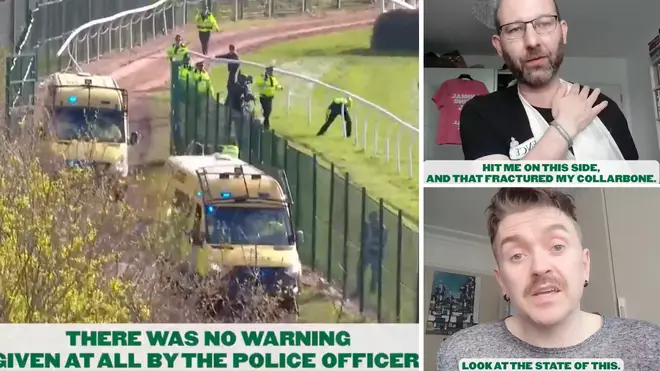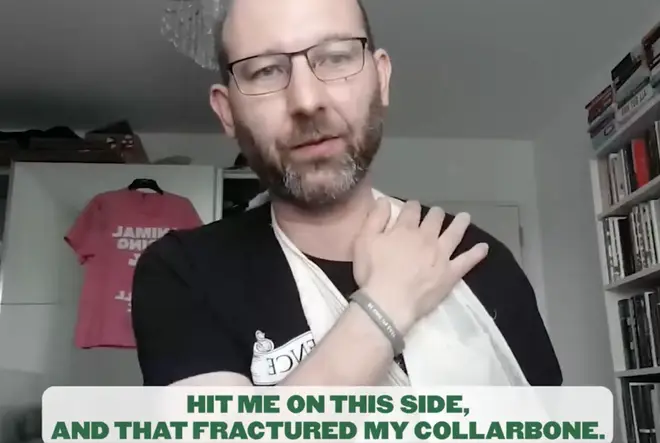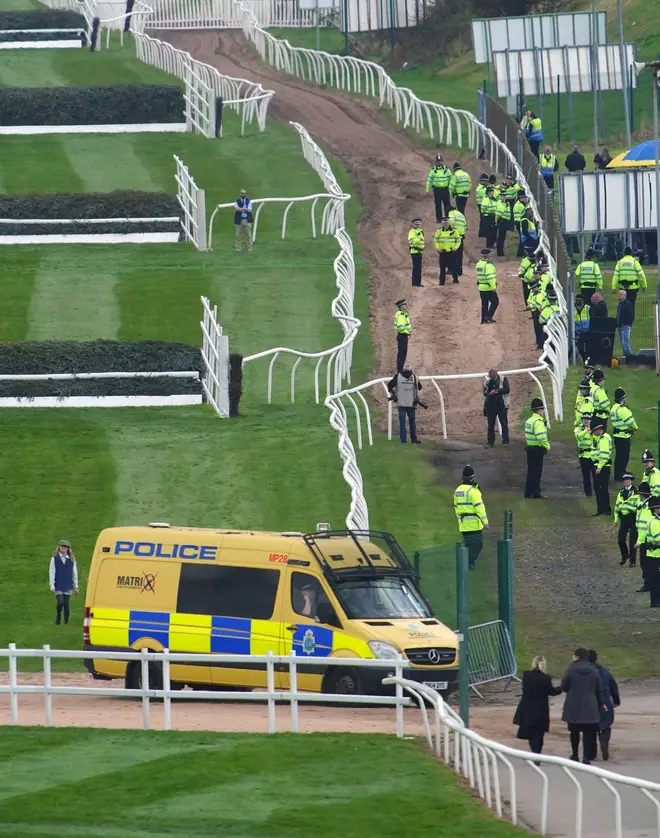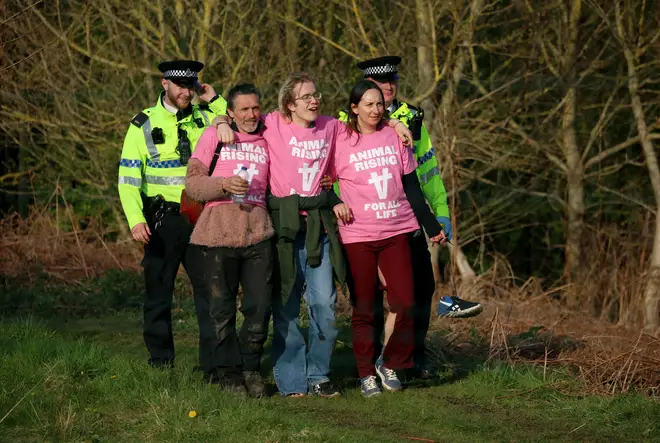
Tom Swarbrick 4pm - 7pm
19 April 2023, 11:55 | Updated: 19 April 2023, 12:11

Protesters who tried to disrupt the Grand National have complained of rough treatment by police and security guards as they were arrested after storming the event.
Activists from the group Animal Rising - and offshoot of Extinction Rebellion - tried to halt the Aintree race at the weekend but their efforts were thwarted by police, security and fans of the race.
The race was delayed by 15 minutes and furious trainers blamed the chaos on the death of a horse. Nearly 120 people were arrested and bailed and now, in a social media clip posted last night, the group have complained of being rough-housed by cops who took an uncompromising approach.

They claimed they suffered broken bones, dog bites and were pepper sprayed in the chaos. Others said they had their hair pulled, and one protester said he was left humiliated by police laughing at him and saying “look at the state of this.”
The group said on Twitter: “On Saturday we took peaceful action at the Grand National, to save lives and bring about a kinder world. In response we were brutalised by police and private security, we've experienced broken bones, dog bites and pepper spray. Is this what democracy looks like?”

Animal protesters who disrupted Grand National moan their 'hair was pulled' by police
One protester, with his arm in a sling, who claimed he had a broken collarbone, said: “He just poleaxed me, flattened me to the ground. Hit me on this side and that fractured my collarbone.

“There was no warning at all given by the police officer, they didn't care, they didn't care what my condition was.”
Another claims he was 'choked unconscious' before being 'pulled by his hair' and called a 'p****' by police.
One man said police officers were “laughing at me “ and “calling other police officers over and saying look at this… look at the state of this, this is hilarious”. He said he heard clicking and claimed police were taking photos of him.
Merseyside Police and G4S have not yet responded to the claims made in the video.
People were not impressed with their claims. One person wrote on Twitter: “On NOES. Will it interfere with skiing?”
Another posted: “Fantastic news, thanks for publicising.”
It’s funny how so little of the described activity was captured in any of the intercut footage?
— meh (@ItsChillyUpHere) April 19, 2023
A third said: “It’s funny how so little of the described activity was captured in any of the intercut footage?”

After the protest, one trainer blamed "ignorant" protesters for more fallen horses than usual this year.
Three horses - Hill Sixteen, Dark Raven and Envoye Special - died during the three-day Aintree Festival last week.
Sandy Thomson, Hill Sixteen's trainer, blamed the "ignorant" Animal Rising protesters for more fallen horses at this year's event.

He told Today: "If we look at the last nine years since the course has been modified, there's been an average of under two fallers at the first two fences and this year everybody got very uptight about it - horses, jockeys, starters - and there were eight fallers at those first two fences.
"This was all caused by these so-called animal lovers who actually are ignorant and have absolutely no idea about welfare of horses."
Mr Thomson said, though, that changes could still be made to make the sport safer, including "a shorter run to the first fence and a few less horses on the field".
The League Against Cruel Sports said the death toll at the Aintree Festival now stands at 62 horses since 2000 - with 16 killed in the Grand National, including two last year.
RSPCA policy director Emma Slawinski told BBC Radio 4's Today programme: "One of the things we particularly see at the Grand National is a very big field, so lots of horses running together.
"That, of course, causes issues when horses fall and can get in the way of other horses and cause accidents in that way.
"The other thing that we think needs to change very urgently is to see an end of the use of the whip for encouragement - hitting the horses to make them run faster.
"We know that that actually causes more accidents, it makes accidents more likely, makes injuries more likely, so we'd like to see that reform happen as well."
Nevin Truesdale, chief executive of The Jockey Club, which owns the Aintree racecourse in Merseyside, said measures including softer ground and smaller hurdles have been imposed in recent years.
He told Sky News: "We did have a very good three days' racing at Britain's second-biggest spectator sport.
"But we can't ignore what happened in terms of the fatalities we saw and every fatality we're seeing is one too many.
"To see three fatalities - and condolences to all connections across the event - obviously it's something we will be analysing and reviewing."
"The fact that 99.8% of horses across all of racing come back from races safely - that's come down by a third over the past 10 years - the sport is safer, the Grand National is safer than it's ever been.
"But that does not mean that we will stop in terms of our relentless drive to improve welfare standards."
Mr Truesdale admitted "you will never eliminate risk completely" in the sport but said horses are "born and bred to race" and the activity "drives breeding and sustainability of the breed itself".